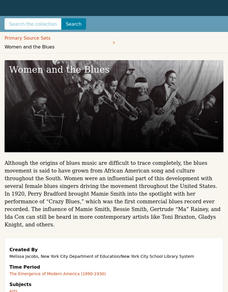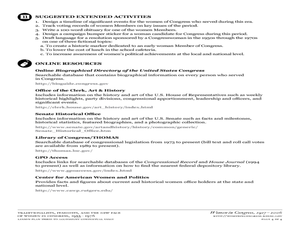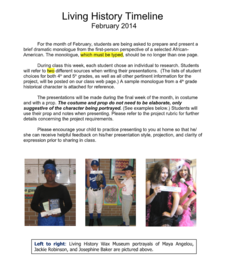US House of Representatives
Black Americans in Congress Speak Their Mind
To conclude their study of Black Americans in Congress, groups select a statement made by one of the Members, examine the Member's profile on the provided link, and create a display that includes state represented, years of service, an...
Curated OER
The AME Church in U.S. History
Ninth graders explore the history of the African Methodist Church in the United States. In this African American history lesson, 9th graders discover why the church was founded and research its history and noteworthy members. Students...
Stanford University
Women in the 1950s
Learners learn about suburban communities in the 1950s. In this women studies lesson, students watch a Power Point presentation about suburban communities in the 1950s. Learners look at images from the 1950s and discuss what they think...
Curated OER
The Changing Role of Women
Eleventh graders examine the evolution of women's rights in America. As they analyze primary documents and discuss historical events, learners determine how Abigail Adams, Eleanor Roosevelt, Lady Bird Johnson, Margaret Sanger, and James...
Education Oasis
Creative Writing Unit: Analyzing, Interpreting, Discussing and Writing Various Genres of African-American Literature
A six-week unit takes high schoolers through various works of African-American literature, including poems, plays, and short stories. The lesson plan format includes a week-by-week description of activities, goals, materials, and...
Curated OER
African American Women Trailblazers
Students take a closer look at the accomplishments of African-American women. In this African-American history lesson, students explore the work of Bessie Coleman, Gwendolyn Bennett, Lulu Madison White, and Zelma Watson George as they...
Center for Civic Education
The Equal Rights Amendment in the 1970s and Today
Discover the fascinating history of the Equal Rights Amendment and discuss the major implications and considerations associated with it today. Here you will find background information on the topic, a graphic organizer summarizing...
Gilder Lehrman Institute of American History
Women's Suffrage: 140 Years of Struggle
Young scholars create PowerPoint presentations about women's suffrage. In this women's rights instructional activity, students use primary documents to study the women's suffrage movement. In pairs, young scholars create a PowerPoint...
NPR
Chinese American Women Lesson Plan
The National Women's History Museum provides a plan designed to accompany their online CyberExhibit, Chinese American Women; a History of Resilience and Resistance. After examining a series of primary and secondary source documents,...
PBS
Women's History: Glass Windows; Glass Ceilings
Discover stories about women's history in beautiful stained glass windows. The second in a three-part series teaches scholars about a famous artistic style of stained glass windows and the influential women that used art to impact...
National Woman's History Museum
Utilizing Historic Sites for National History Day Research
The National History Day Research program is designed to permit young historians to interview the staff at any historic site. As part of Women's History Month, class members select a site that focuses on the contributions of women. Using...
Digital Public Library of America
Women and the Blues
A 12-piece primary source packet sets the tone for a study of the role women played in the origins, development, and impact of blues music. Legends like Bessie Smith, Gertrude "Ma" Rainey, Mamie Smith, and Ida Cox are featured, as are...
Center for Civic Education
Women's History Month Word Clouds
What a great idea for celebrating Women's History Month and discovering the amazing efforts that individuals have put forth on behalf of women's rights! Learners take a closer look at the speeches and other primary source documents of...
Digital Public Library of America
A Raisin in the Sun by Lorraine Hansberry
A set of 14 primary sources provides background for a study of Lorraine Hansberry's drama, A Raisin in the Sun. Featured are images from stage productions of the play, white supremacy protests, a clip from a television interview, and...
Curated OER
A Changing of the Guard: Traditionalists, Feminists, and the New Face of Women in Congress
Students explore the role of women as Congressional leaders. In this women's rights lesson, students identify and investigate the impact of women representatives and senators in the U.S. Legislative Branch. Comprehension questions, data,...
Crafting Freedom
Man in the Middle: Thomas Day and the Free Black Experience
How did free and enslaved blacks work to craft freedom for themselves and their families before the Civil War? Young historians read about the life of Thomas Day, a free black man who also owned slaves and had abolitionist ties in...
Curated OER
Women in the Civil War: Ladies, Contraband and Spies
Learners interpret historical evidence presented in primary and secondary resources. For this American Civil War lesson, students research diaries, letters, and photographs of women involved in the war.
Syracuse University
Women's Suffrage Movement
Women gained the right to vote in the twentieth century, but the fight for equality dates back centuries. Using an invitation to an 1874 suffrage convention, eager historians consider the motivations behind supporters of the suffrage...
Center for History Education
How Did the Public View Women’s Contributions to the Revolutionary War Effort?
Calling upon the legacies of Joan of Arc, Elizabeth I, and Catherine the Great, Esther Reed rallied Southern women to support the American Revolution. Using a broadside by Reed and other primary sources, such as poetry, young historians...
NPR
Suffrage Lesson Plan
Has life changed for American women in the last century, or are there common themes between the lives of 21st century women and the struggle of suffragettes from the 1910s? Explore the ways media reflects the position of women in the...
Brockman Elementary School
Living History Timeline
As part of a living history research project, learners research a chosen historical figure that they will study and physically represent in a gallery walk. This resource includes a project description, letter to parents, rubric, and...
Curated OER
Where are the Famous Women in History?
Students investigate sexism in history by identifying important women from the U.S. In this women's equality activity, students discuss why they remember more men in the history of the U.S. than women. Students compare women's and...
Center for History Education
Speaking Up and Speaking Out: Exploring the Lives of Black Women During the 19th Century
Young historians investigate the often-hidden history of free and enslaved African American women before the Civil War. Using a collection of primary and secondary sources, including speeches, diaries, and poems, they evaluate the often...
Center for History Education
Native American Gender Roles in Maryland
Toss gender roles out the window—some societies lived in a world where women not only possessed the family wealth but also were the farmers and butchers. Many Native American societies had more gender equity than European societies....

























